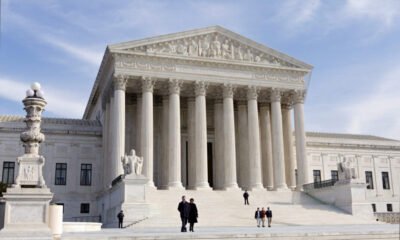border
Supreme Court Greenlights Trump’s Efforts to Deport to El Salvador Prison

The Supreme Court has lifted a restraining order that previously halted deportation flights under the Alien Enemies Act. This ruling, issued on Monday, allows President Donald Trump’s administration to proceed with deportations despite ongoing legal challenges.
The decision emerged from a slim 5-4 majority, emphasizing that the appeal filed by migrants lacked jurisdiction in Washington, D.C., as the district of confinement is in Texas. “For ‘core habeas petitions,’ ‘jurisdiction lies in only one district: the district of confinement,’” stated the majority in a per curiam opinion.
Four justices—Sonia Sotomayor, Elena Kagan, Ketanji Brown Jackson, and Amy Coney Barrett—dissented. They criticized the majority for undermining the rule of law. The dissent argued that requiring each migrant to file a habeas action could lead to severe consequences, placing individuals at significant risk of harm upon removal.
Sotomayor highlighted potential life-threatening outcomes, stating, “Individuals who are unable to secure counsel… face the prospect of removal directly into perilous conditions.” Her dissent underscored the risks associated with deportations to violence-prone areas like El Salvador.
The Justice Department is hastening deportations to a notorious prison in El Salvador, citing national security as a primary concern. Last month, 137 migrants were transferred due to alleged affiliations with the Tren de Aragua gang, which the administration describes as aligned with Venezuelan President Nicolás Maduro’s regime.
However, civil rights groups have contested these assertions, claiming the allegations are based on inconclusive evidence like tattoos. The department also acknowledged an error that resulted in a Salvadoran migrant being deported despite having asylum protections, underlining the risks of administrative mistakes.
The Alien Enemies Act of 1798 grants the president authority to detain and deport nationals from enemy nations, a measure historically applied during significant conflicts. Critics, including the ACLU, argue that its invocation during peacetime is misaligned with its intended purpose.
In response to these deportations, the ACLU filed legal challenges on behalf of migrants claiming wrongful identification as gang members. The organization argues that the administration’s approach conflates migration with invasion, a misinterpretation of the statute’s limited wartime scope.
Despite receiving a temporary restraining order, flights continued as the administration pressed ahead. Chief U.S. District Judge James Boasberg expressed uncertainty regarding the compliance with his orders, sparking frustration from the administration and criticism from Trump, who disparaged the judge’s integrity.
The contentious ruling by the D.C. Circuit Court reflected ongoing tensions, raising concerns over the treatment of individuals subject to expedited removals. Judge Patricia Millett voiced alarm regarding the implications for around 300 similarly situated migrants.


















